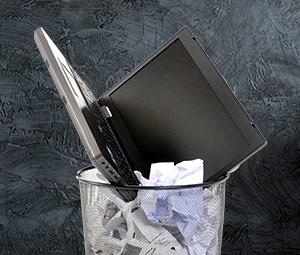Subscribe to our newsletter!
Stay updated with the latest security news, tips, and promotions.
 So you have taken advantage of a super recent deal and bought yourself – or received from a loved one – a new computer? Congratulations! Getting rid of the old one? You can ensure its hard drive doesn’t become a treasure chest for identity thieves. Use a program that overwrites or wipes the hard drive many times. Or remove the hard drive, and physically destroy it.
So you have taken advantage of a super recent deal and bought yourself – or received from a loved one – a new computer? Congratulations! Getting rid of the old one? You can ensure its hard drive doesn’t become a treasure chest for identity thieves. Use a program that overwrites or wipes the hard drive many times. Or remove the hard drive, and physically destroy it.
Understand Your Hard Drive
Computers often hold personal and financial information, including:
When you save a file, especially a large one, it is scattered around the hard drive in bits and pieces. When you open a file, the hard drive gathers the bits and pieces and reconstructs them.
When you delete a file, the links to reconstruct the file disappear. But the bits and pieces of the deleted file stay on your computer until they’re overwritten, and they can be retrieved with a data recovery program. To remove data from a hard drive permanently, the hard drive needs to be wiped clean.
How to Clean a Hard Drive
Before you clean a hard drive, save the files you want to keep to:
Check your owner’s manual, the manufacturer’s website, or its customer support service for information on how to save data and transfer it to a new computer.
Utility programs to wipe a hard drive are available both online and in stores where computers are sold. These programs generally are inexpensive; some are available on the internet for free. These programs vary:
– Some erase the entire disk, while others allow you to select files or folders to erase.
– Some overwrite or wipe the hard drive many times, while others overwrite it only once.
Consider using a program that overwrites or wipes the hard drive many times; otherwise, the deleted information could be retrieved. Or remove the hard drive, and physically destroy it.
If you use your home or personal computer for business purposes, check with your employer about how to manage the information on your computer that’s business-related. The law requires businesses to follow data security and disposal requirements for certain information that’s related to customers.
How to Dispose of Your Computer
Recycle it.
Many computer manufacturers have programs to recycle computers and components. Check their websites or call their toll-free numbers for more information. The U.S. Environmental Protection Agency (EPA) has information about electronic product recycling programs. Your local community may have a recycling program, too. Check with your county or local government, including the local landfill office for regulations.
Donate it.
Many organizations collect old computers and donate them to charities.
Resell it.
Some people and organizations buy old computers. Check online.
ZoneAlarm: Protect Your New One
Provided you will give the wisest destination for your old computer, let’s focus now on the new one. ZoneAlarm is a must-have. Nearly 100 million people worldwide trust ZoneAlarm to protect their PCs from viruses, spyware, hackers and identity theft with advanced anti-phishing protection. In addition, we have also the market’s leading anti-ransomware solution to protect you from cyber extortion. To learn more, click here.
The Federal Trade Commission (FTC) website was partly a source for this article. As the United States consumer protection agency, the FTC works to prevent fraudulent, deceptive and unfair business practices in the marketplace.